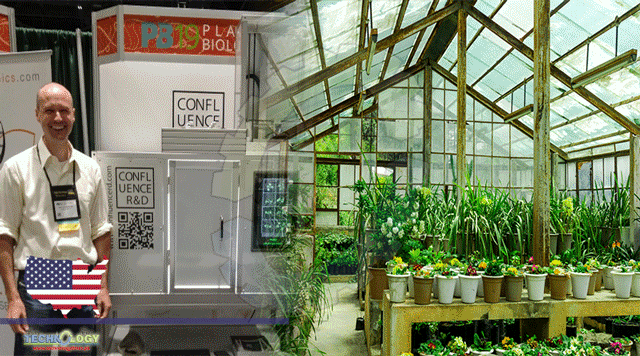A Purdue University-Affiliated Startup That Designs, Distributes And Supports Direct-To-Consumer, In-Home Greenhouses.

A Purdue University-Affiliated Startup That Designs, Distributes And Supports Direct-To-Consumer, In-Home Greenhouses has won a National Science Foundation Small Business Innovation Research grant. The SBIR grant, worth $256,000, is in addition to $50,000 in matching funding from Elevate Ventures to conduct research and development work on multispectral photomorphogenesis in rotary aeroponic cultivation chambers.
Heliponix LLC, founded by Purdue Polytechnic Institute graduates Ivan Ball and Scott Massey, sells the GroPod Smart Garden Appliance. It is a small in-home greenhouse to grow daily servings of Pure Produce from subscription Seed Pods. The dishwasher-sized device fits under a kitchen counter and grows produce year-round, providing consumers with lettuce and other greens that are fresh and pesticide-free.
Lighting and Technology
The Lighting Enabled Systems and Applications (LESA) Center of Rensselaer Polytechnic Institute is working with Heliponix to provide research-grade, multi-spectral, tunable LED modules and associated programmable control systems compatible with Heliponix’s rotary chamber. These modules are based on the LESA Center’s TIGER horticulture research lighting modules and will provide the research flexibility needed in Phase I to optimize the LED illumination impact on plant growth variables in leafy greens including biomass, crop yield, nutritional content and energy efficiency.
“NSF is proud to support the technology of the future by thinking beyond incremental developments and funding the most creative, impactful ideas across all markets and areas of science and engineering,” said Andrea Belz, division director of the Division of Industrial Innovation and Partnerships at NSF. “With the support of our research funds, any deep technology startup or small business can guide basic science into meaningful solutions that address tremendous needs.”
Food security
Massey said, “In the wake of the ongoing coronavirus pandemic’s disruptive force on produce cultivation, and recurring food safety recalls, there’s an urgent need to democratize cultivation to establish food sovereignty. We are incredibly thankful for the backing of the National Science Foundation, Purdue University, Elevate Ventures and the countless Hoosiers who have supported our pursuit to grow to become the world’s largest farm through our connected, smart garden appliances known as GroPods without owning a single acre of land.”
Once a small business gains a Phase I SBIR/STTR grant (up to $256,000), it becomes eligible to apply for a Phase II grant (up to $1,000,000). Small businesses with Phase II grants are eligible to receive up to $500,000 in additional matching funds with qualifying third-party investment or sales.
Startups or entrepreneurs who submit a three-page project pitch will know within three weeks if they meet the program’s objectives to support innovative technologies that show promise of commercial and/or societal impact and involve a level of technical risk. Small businesses with innovative science and technology solutions, and commercial potential are encouraged to apply. All proposals submitted to the NSF SBIR/STTR program, also known as America’s Seed Fund powered by NSF, undergo a rigorous merit-based review process.
This news was originally published at Horti Daily.